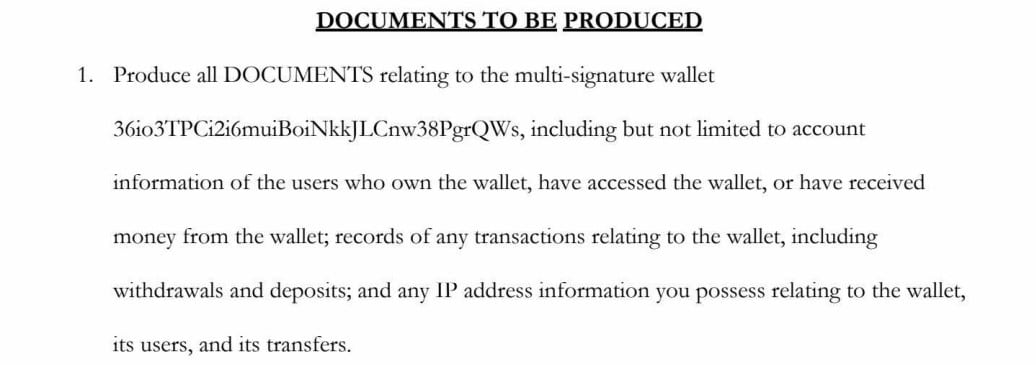In a bid to identify individuals allegedly involved in creating and distributing cheats for the video game Destiny 2, Bungie has subpoenaed the U.S.-based cryptocurrency exchange Kraken. The subpoena seeks to identify the owner of a Bitcoin wallet, who is believed to be a European resident. This individual, however, is contesting the subpoena, claiming it violates EU privacy laws and other regulations.
Over the past several years, Destiny 2 creator Bungie has pursued legal action against several cheat sellers and cheat makers.
This has resulted in a number judgments and settlements in Bungie’s favor, but the gaming company isn’t done just yet.
Furthering its efforts to protect the integrity of its games, last year Bungie filed a second lawsuit against numerous individuals allegedly involved in cheat maker and distributor operation Ring-1.
Filed at a Washington federal court, the complaint named numerous defendants with others listed as John Does. While it would have been easy to let these ‘anonymous’ cheaters slide, Bungie vowed to leave no stone unturned, stating that the days of cheating “without fear of consequences are over.”

Bungie’s Warning
Relentless Pursuit to Unmask Cheaters
Bungie’s strongly worded warning was no bluff. During the past year, the game company used third-party discovery to gather more information on both the named defendants and the anonymous Does. Over a dozen names and nicknames were added to the lawsuit, and more could follow.
In August, Bungie filed a sealed motion for expedited discovery, requesting permission to subpoena additional third parties for information. The request was granted a month later, but the names of the target companies were redacted.

Discovery Granted
The United States-based cryptocurrency exchange Kraken was later confirmed as one of the targets. Kraken is a brand of Payward Inc. and a few weeks ago Bungie sent a subpoena to the company, requesting detailed information on the owner of a Bitcoin wallet.
Bungie Goes After Kraken Bitcoin Wallet
The subpoena doesn’t explain the relevance of the requested information, at least not publicly, but Bungie is asking for details related to the multi-signature wallet 36io3TPCi2i6muiBoiNkkJLCnw38PgrQWs.
According to blockchain data, this wallet was used to send and receive more than ten bitcoins between March 2021 and November 2024. At the time of writing, however, the wallet is completely empty.
Bungie is interested in any and all information relating to the wallet and its owner. This includes personal details, transaction records, access records, withdrawals, deposits, communication, IP-addresses, and more.

Some of the Requested Info
Wallet Owner Objects
The owner of the wallet remains unidentified for now, but the John Doe is not pleased with Bungie’s evidence gathering tactic. This week, they submitted a motion to quash the subpoena, arguing that it fails to comply with federal rules and international privacy regulations.
The “John Doe” explains, for example, that the subpoena doesn’t provide any evidence explaining why the wallet information is relevant for the underlying lawsuit. In addition, it allegedly goes beyond geographical limits, as the wallet owner is a European resident.
The European angle is also important from a privacy standpoint. The wallet owner reportedly used a European affiliate of Payward, which is bound to European privacy regulations including the GDPR. This means that personal information can’t be shared with the U.S. without proper safeguards.
“Apparently, a Payward affiliate located in the European Union that provided services to Objector transferred Objector’s information to Payward in the U.S. It is unclear how the EU affiliate justified such data transfer to the U.S.,” the motion to quash adds.
“Without binding measures ensuring compliance with GDPR standards, any transfer of Objector’s personal data would be unlawful under the EU’s GDPR.”
To strengthen this privacy argument, the filing references several cases where U.S. companies were fined in the EU for privacy violations. Uber, for example, received a 290 million euro fine because it transferred drivers’ data to the U.S.
Responding to the motion, Bungie argued on Thursday that the “John Doe” should reveal their identity. The company argues that parties must presumptively litigate under their real names, and pseudonymous litigation is reserved for “unusual cases.”
The court has yet to rule on the motion to quash, but it’s clear that Bungie’s efforts to unmask alleged cheaters aren’t always straightforward. After years of court battles, this won’t come as a surprise to the video game company.
—
A copy of John Doe’s memorandum of law in support of the motion to quash is available here (pdf)
Hope you enjoyed this news post.
Thank you for appreciating my time and effort posting news every day for many years.
2023: Over 5,800 news posts | 2024 (till end of November): 5,298 news posts
RIP Matrix | Farewell my friend ![]()



3175x175(CURRENT).thumb.jpg.b05acc060982b36f5891ba728e6d953c.jpg)
Recommended Comments
There are no comments to display.
Join the conversation
You can post now and register later. If you have an account, sign in now to post with your account.
Note: Your post will require moderator approval before it will be visible.